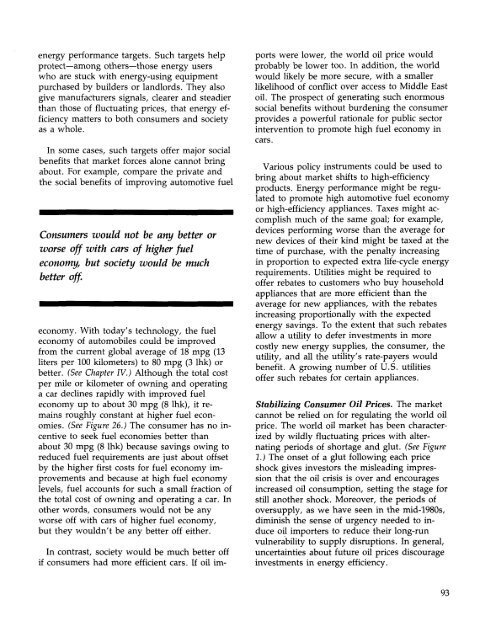ENERGY FOR A SUSTAINABLE WORLD - World Resources Institute
ENERGY FOR A SUSTAINABLE WORLD - World Resources Institute
ENERGY FOR A SUSTAINABLE WORLD - World Resources Institute
Create successful ePaper yourself
Turn your PDF publications into a flip-book with our unique Google optimized e-Paper software.
energy performance targets. Such targets help<br />
protect—among others—those energy users<br />
who are stuck with energy-using equipment<br />
purchased by builders or landlords. They also<br />
give manufacturers signals, clearer and steadier<br />
than those of fluctuating prices, that energy efficiency<br />
matters to both consumers and society<br />
as a whole.<br />
In some cases, such targets offer major social<br />
benefits that market forces alone cannot bring<br />
about. For example, compare the private and<br />
the social benefits of improving automotive fuel<br />
Consumers would not be any better or<br />
worse off with cars of higher fuel<br />
economy, but society would be much<br />
better off.<br />
economy. With today's technology, the fuel<br />
economy of automobiles could be improved<br />
from the current global average of 18 mpg (13<br />
liters per 100 kilometers) to 80 mpg (3 lhk) or<br />
better. (See Chapter IV.) Although the total cost<br />
per mile or kilometer of owning and operating<br />
a car declines rapidly with improved fuel<br />
economy up to about 30 mpg (8 lhk), it remains<br />
roughly constant at higher fuel economies.<br />
(See Figure 26.) The consumer has no incentive<br />
to seek fuel economies better than<br />
about 30 mpg (8 lhk) because savings owing to<br />
reduced fuel requirements are just about offset<br />
by the higher first costs for fuel economy improvements<br />
and because at high fuel economy<br />
levels, fuel accounts for such a small fraction of<br />
the total cost of owning and operating a car. In<br />
other words, consumers would not be any<br />
worse off with cars of higher fuel economy,<br />
but they wouldn't be any better off either.<br />
In contrast, society would be much better off<br />
if consumers had more efficient cars. If oil imports<br />
were lower, the world oil price would<br />
probably be lower too. In addition, the world<br />
would likely be more secure, with a smaller<br />
likelihood of conflict over access to Middle East<br />
oil. The prospect of generating such enormous<br />
social benefits without burdening the consumer<br />
provides a powerful rationale for public sector<br />
intervention to promote high fuel economy in<br />
cars.<br />
Various policy instruments could be used to<br />
bring about market shifts to high-efficiency<br />
products. Energy performance might be regulated<br />
to promote high automotive fuel economy<br />
or high-efficiency appliances. Taxes might accomplish<br />
much of the same goal; for example,<br />
devices performing worse than the average for<br />
new devices of their kind might be taxed at the<br />
time of purchase, with the penalty increasing<br />
in proportion to expected extra life-cycle energy<br />
requirements. Utilities might be required to<br />
offer rebates to customers who buy household<br />
appliances that are more efficient than the<br />
average for new appliances, with the rebates<br />
increasing proportionally with the expected<br />
energy savings. To the extent that such rebates<br />
allow a utility to defer investments in more<br />
costly new energy supplies, the consumer, the<br />
utility, and all the utility's rate-payers would<br />
benefit. A growing number of U.S. utilities<br />
offer such rebates for certain appliances.<br />
Stabilizing Consumer Oil Prices. The market<br />
cannot be relied on for regulating the world oil<br />
price. The world oil market has been characterized<br />
by wildly fluctuating prices with alternating<br />
periods of shortage and glut. (See Figure<br />
1.) The onset of a glut following each price<br />
shock gives investors the misleading impression<br />
that the oil crisis is over and encourages<br />
increased oil consumption, setting the stage for<br />
still another shock. Moreover, the periods of<br />
oversupply, as we have seen in the mid-1980s,<br />
diminish the sense of urgency needed to induce<br />
oil importers to reduce their long-run<br />
vulnerability to supply disruptions. In general,<br />
uncertainties about future oil prices discourage<br />
investments in energy efficiency.<br />
93

















